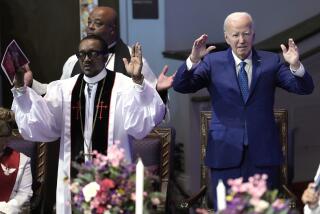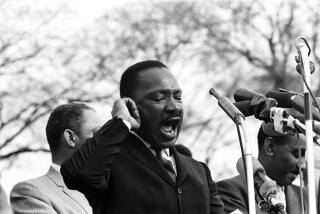A Feminist Send-Off for a Million Men : Farrakhan aside, the march in Washington holds promise for the needs of women, children.
- Share via
Across the country, hundreds of thousands of men gather as Promise Keepers, vowing loyalty and responsibility to their families. Now, Louis Farrakhan hopes to mobilize a million African American men to march on Monday in Washington in what is being called a Holy Day of Atonement and Reconciliation.
What is going on? If I were a space traveler from another planet, I might wonder why so many American men feel estranged from their families and endangered by their society.
And perhaps my concern would be appropriate. Unlike some feminists, I do not regard these activities as a backlash against the gains women have made during the last two decades. To be sure, the Promise Keepers, as well as Farrakhan’s minions, stoke men’s nostalgic desire to gain control over family life. Both offer a Faustian bargain that promises support and loyalty in exchange for power and control. “We’ll come back, we’ll be faithful, we’ll support our women and children, but only if we can rule the family.”
But it is an anachronistic bargain, one that reveals how much the nation still suffers from cultural lag. Men’s historic patriarchal role was grounded in their ability to support their families and pass on their land or craft to their sons. That economic clout was eroded a long time ago, not by feminism, but by the replacement of farming and manufacturing with a service economy, and by the unbridled nature of mobile capital. And the majority of men, especially African Americans, never enjoyed such patriarchal clout anyway.
Still, the myth lives on, despite the economic realities of the present. Today, American men feel lucky if they have a job and even luckier if they don’t lose it. Jostled about by corporate layoffs and impoverished by minimal wages, they know they offer their families the most fragile kind of security. The entry of women into the labor force--largely to help support their families--has only intensified and magnified men’s sense of loss of power.
I and many other women reject the bargain to restore patriarchy because it violates the egalitarian spirit that ought to prevail in a democratic society. Still, the Promise Keepers and the Million Man March are important if men are ever to be reintegrated into family life. Organizers may try to attract men with the promise of patriarchal authority, but economic reality invariably persuades men to accept some kind of gender equality.
For the African American family in particular, the situation has grown desperate. When one-third of young black men are either imprisoned or in some form of judicial custody, it is no longer hyperbole to describe them as an endangered species. These young men will not live to be fathers who can nurture their children into adulthood.
That is why Monday’s march is so important and timely.
Like many people, I’m not thrilled that Farrakhan initiated this event; I have been outraged by his anti-Semitic and sexist pronouncements. But I applaud the dedicated African American leaders, including Rep. Ron Dellums of Oakland and the Rev. Jesse Jackson, who have sensibly hijacked the occasion and broadened the message that a million men can broadcast to white America. By including Rosa Parks and Maya Angelou as speakers, moreover, they have linked the courageous past to the poetic promise of a rejuvenated future. They have recast the occasion so that men can do more than atone; they may also bear witness to the conditions of their lives and reflect on the need to strengthen African American family life.
Some will say that women should not be excluded from the march itself. But it is not women’s violence that is tearing apart the American family. In the wake of the Republican assault against welfare, health care, public education and affirmative action, black families justifiably feel endangered and hopeless. And violence is the child of despair.
All demonstrations, however peaceful, hint at the dangerous potential of an aggrieved crowd. On Monday, the entire nation will have the opportunity to watch an army of black men marching through the nation’s capital. For some whites, it will be their worst nightmare come true. The men will come for different reasons, some to bear witness, some to reconsider their responsibility to family life, some for less benign purposes. In any event, their collective presence will underscore the fact that black men’s extreme estrangement from family can either lead to reconciliation or to violence.
The hidden injuries of race, which so profoundly affect family life, appear to be invisible to many Americans. White America should listen and watch carefully. The stakes have never been higher.
More to Read
Sign up for Essential California
The most important California stories and recommendations in your inbox every morning.
You may occasionally receive promotional content from the Los Angeles Times.













